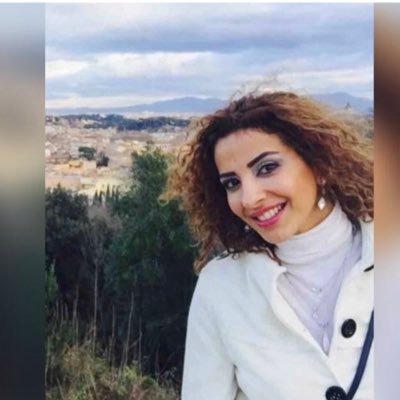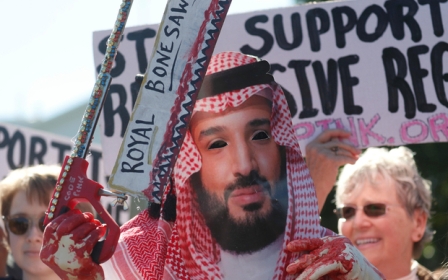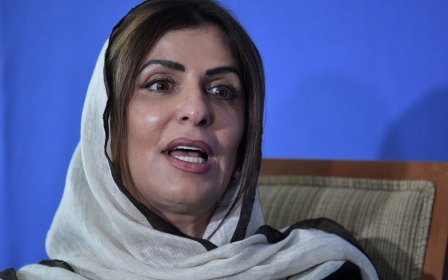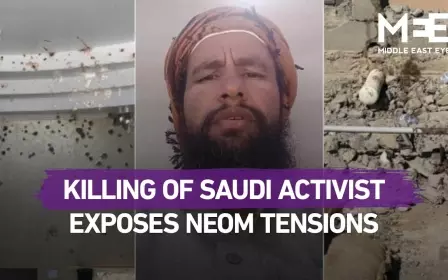Dissident former Saudi jockey alleges poison threat and attempt to 'lure' her home

A Saudi dissident and former jockey now based in London has alleged that she received multiple threats, including a tip-off about potentially being poisoned, after speaking out against the kingdom.
Alya al-Howeiti told Norweigan newspaper Dagbladet that she was summoned to the Saudi embassy in London for her outspoken views, and that a royal attempted to “lure” her back to the country.
Howeiti had been a celebrated jockey in Saudi Arabia since 1996, and in 2005 became the first Saudi female jockey to compete internationally. She relocated to the UK in 2011, and has since spoken out against Riyadh’s policies, including the Saudi-led coalition’s military intervention in the war in Yemen.
Howeiti said she was summoned to the embassy in London in 2018 due to tweets she had posted.
'The ambassador tried to persuade me to change what I wrote on Twitter. I was terrified. They wanted me to support the Yemeni war and stop criticising the regime'
- Alya al-Howeiti
“The ambassador tried to persuade me to change what I wrote on Twitter. I was terrified. They wanted me to support the Yemeni war and stop criticising the regime,” she told Dagbladet.
The jockey-turned-activist said that she was only released once she agreed to delete the tweets in question - though she did not end up removing the posts as promised.
Howeiti had been working with the Saudi embassy at the time, but resigned from the post and decided to become an opposition activist “because of how the regime behaved”.
Fears of being poisoned or 'lured' back
The former sports star said she has received multiple death threats online.
“I have received messages - both on WhatsApp and Twitter - that they will throw acid in my face, that they will shoot me, drive me down by car, that they will kidnap me, that I have to look over my shoulder. There have been pictures of a saw,” she said.
Howeiti claimed to have received a tip-off from a long-term contact in the Saudi royal court that she may be poisoned, and was warned to be “careful about what you eat and drink”.
“I received a message that two men from Saudi Arabia had flown to London with a dose of poison. The poison was specially designed to give no symptoms if you died from it,” she told Dagbladet.
'I received a message that two men from Saudi Arabia had flown to London with a dose of poison. The poison was specially designed to give no symptoms if you died from it'
- Alya al-Howeiti
The Saudi embassy in London did not respond to questions about the alleged poison threat, or any of Howeiti’s allegations.
She is not the first prominent Saudi woman to face a backlash after speaking out against the war in Yemen.
Princess Basma bint Saud, the cousin of Crown Prince Mohammed bin Salman, has not been seen publicly since she called for an end to the Saudi intervention in the war-torn country during a BBC Arabic interview in 2018.
Earlier this year, the princess pleaded to the king and crown prince to release her from al-Hair prison near Riyadh.
Howeiti also claimed that Prince Al-Waleed bin Talal, a billionaire businessman who was included in TIME magazine’s 100 most influential people in 2008, attempted to “lure” her back to Saudi Arabia.
Dagbladet published messages the newspaper said the prince had sent Howeiti.
“You can come as long as you want. We have a beautiful stable for horses,” one said. “It must happen very soon. The job is actually taken, and the horses need help and care immediately. Everything is 100 percent clear.”
Prince Al-Waleed financially backed Howeiti’s equestrian career, and said he was “delighted to support her” in comments made in 2005.
Howeiti said the messages were sent in a friendly tone, but it felt as if she was being “lured” back to the kingdom. She said she received other lucrative offers to return home from wealthy Saudis, as long as she started supporting the authorities.
Dagbladet said it had asked Prince Al-Waleed for comment, but received no response.
The prince, once Saudi Arabia's wealthiest man, was caught up in the 2017 purge and detained in the Riyadh Ritz-Carlton on corruption charges. He was released after three months following a financial settlement.
The report from Dagbladet comes just a day after it revealed that Norway had refused to give a Saudi security team diplomatic immunity and alerted prominent Oslo-based human rights activist Iyad al-Baghdadi of the incident.
The request was made just weeks before journalist Jamal Khashoggi was murdered by a Saudi hit squad in the kingdom's consulate in Istanbul on 2 October 2018.
Outspoken against Neom project
Howeiti is from the Howeitat tribe, which has gained international attention in recent years due to the controversial Neom megacity project.
Neom, which has been referred to by Riyadh as the world’s most ambitious project, is due for completion in 2025 on the Red Sea coast in northwestern Tabuk province. It is slated to be 33 times the size of New York City.
To make way for the new city, members of the Howeitat tribe are being evicted from their homes.
MEE reported in April that tribal activist Abdul-Rahim al-Howeiti was shot dead shortly after making videos protesting his eviction.
Alya al-Howeiti has often spoken out against the project, which has displaced her fellow tribesmen and women.
“For the Huwaitat tribe, Neom is being built on our blood, on our bones,” she told the Guardian in May. “It’s definitely not for the people already living there. It’s for tourists, people with money. But not for the original people living there.”
She said that Abdul-Rahim al-Howeiti was killed “to set an example - anyone opening their mouth gets the same treatment”.
Middle East Eye propose une couverture et une analyse indépendantes et incomparables du Moyen-Orient, de l’Afrique du Nord et d’autres régions du monde. Pour en savoir plus sur la reprise de ce contenu et les frais qui s’appliquent, veuillez remplir ce formulaire [en anglais]. Pour en savoir plus sur MEE, cliquez ici [en anglais].





